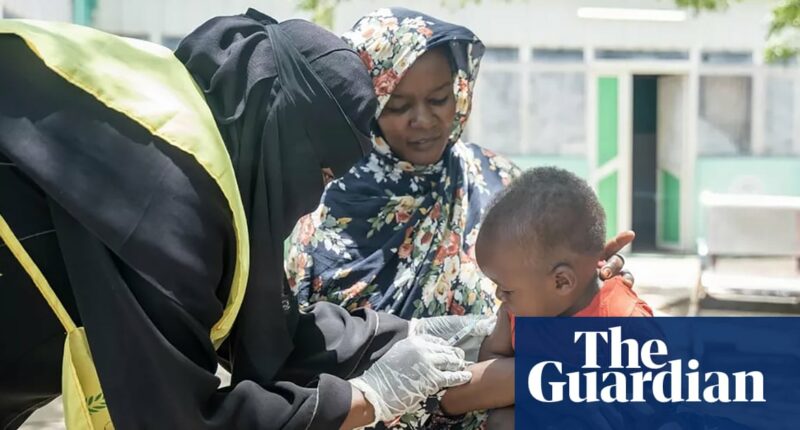Share this @internewscast.com
Children in Sudan, caught up in what aid organisations have called the world’s largest humanitarian crisis and threatened by rising levels of violence, are increasingly vulnerable to deadly infectious diseases as vaccinations in the country plummet.
In 2022, more than 90% of young children in Sudan received their routine vaccinations. But that figure has nearly halved to 48%, the lowest in the world, according to the World Health Organization.
Globally, more than 14 million infants remain unvaccinated and the world is not on track to meet goals of halving the number of these “zero-dose” children compared with 2019 levels by 2030, the WHO reported on Tuesday.
While misinformation and vaccine hesitancy have driven falls in immunisation in some countries, “that has not been the problem here”, said Dr Tedbabe Degefie Hailegebriel, chief of health for Unicef Sudan. “This plummeting coverage is driven entirely by the war.”
The country’s civil war began two years ago and has killed tens of thousands of people and displaced millions more, in what the International Rescue Committee has called “the biggest humanitarian crisis ever recorded”.
There were 838,000 children in Sudan last year who did not receive a single dose of vaccine – the third-highest figure in the world, behind only Nigeria (2.1 million) and India (909,000).
The proportion of children who have received a DTP-1 jab – the first dose of the diphtheria, tetanus and pertussis (whooping cough) vaccine – is seen as a key indicator of access to essential healthcare. Missing it, Hailegebriel said, meant a “child, and most probably also their parents, have almost zero contact with the health system”.
She said the war had hit Sudan’s health service hard, with people displaced and the physical destruction of health facilities, supply lines and information systems “that makes the health service functional”.
“Health workers – doctors, nurses, midwives, community volunteers – have not been paid in months. And just the basic infrastructure – the clean water available to health facilities, the electricity availability to health facilities – is totally destroyed,” she said.
Disease outbreaks in Sudan tend to affect people who have “lost your safe place, your home, your protection, however modest that might be”, and find themselves in camps or temporary accommodation.
“When that is coupled with an already vulnerable child who is not vaccinated, the vulnerability is compounded,” she said.
Diseases that can be prevented with vaccination, including measles, not only kill but can leave survivors with long-term complications, Hailegebriel said, adding that these were “children who are robbed of their future”.
The WHO said war and conflicts around the world were a major threat to immunisation progress, with children living in one of 26 countries “affected by fragility, conflict or humanitarian emergencies” being three times more likely to be unvaccinated than their counterparts in stable countries.
However, there were “emerging signs of slippage” or stalling progress in many parts of the world, said Dr Kate O’Brien, director of the WHO’s immunisation, vaccines and biologicals department.
“Even the smallest drops in immunisation coverage as measured at the country level can have devastating consequences. It opens the door to deadly disease outbreaks and puts even more pressure on health systems that are already stretched,” she said.
And while access to vaccination remains the main issue worldwide, “we’re extremely concerned about mis- and disinformation because of the threat it has to worsen the situation”.
O’Brien said she expected cuts to aid funding to affect vaccine coverage in future years, with countries struggling to raise domestic finance.
Humanitarian efforts had succeeded in boosting vaccination rates in the first half of this year in Sudan, said Hailegebriel, but Unicef’s appeal for the country remained unfunded.
The charity has shipped in containers to rebuild the country’s “cold chain”, vital for keeping vaccines and other essential medicines at the right temperature so they remain effective on the journey from factory to patient. But when conflict flares those efforts have to stop.
“In areas where there was active fighting, active conflict, of course we will not be able to deliver,” she said. “But when the situation changes, that’s when we move in.
“The destruction is unspeakable. The whole infrastructure gets damaged, medicines get looted. So whenever you go into those new areas, it is again rebuilding to make sure the already shaking health system doesn’t collapse further.
“The situation of Sudan has not received the world’s attention it deserves,” she said. “It is our hope that this will change, and these hostilities stop so that children get the peaceful environment they need to live and thrive.”
Abdallah Idriss Abugarda, who leads the Darfur Diaspora Association in the UK, said the situation in the Darfur region was becoming more difficult, particularly in the besieged city of El Fasher.
That meant, Abugarda said, that most families he spoke to in Sudan had more pressing concerns than vaccination. “It’s not a priority to them – they want to have food delivered, and medicine for malaria and fever for the children.”












